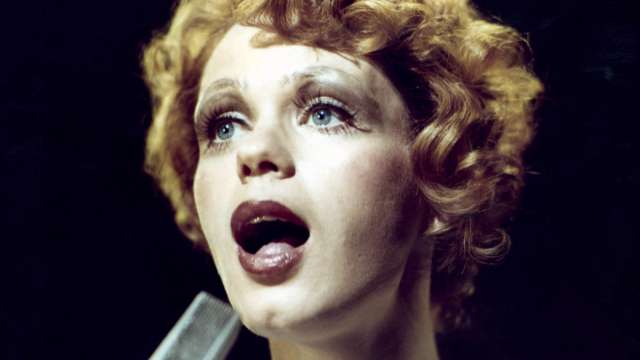
DEFA
Deutsche Film AG (DEFA) was the film production company of the German Democratic Republic (GDR). It was founded in Potsdam-Babelsberg in 1946 and had several studios. By 1992, it had produced some 2,500 newsreels and periodicals, 2,000 documentaries, 950 animated films, 730 feature films and 450 fictional short films as well as 6,700 dubbed versions of foreign films.
The Second World War had proven decisive for German film landscape, after which it had to be rebuilt and reorganized. The leading film company in Germany until then had been Universum Film AG (Ufa). Its studios, located in the Soviet Occupation Zone, were confiscated by the Soviet Military Administration in Germany (SMAD) and the production of films without a SMAD license was prohibited. The SMAD, however, was interested in the rapid reconstruction of the German film industry. On 17 May 1946 it founded a Soviet-German film production company – Deutsche Film AG, or DEFA for short.
DEFA benefited from the existing infrastructure. From 1946, it was able to use the former Althoff film studios in Potsdam-Babelsberg and Tobis in Berlin-Johannisthal, and from 1947 also the former Ufa studios in Babelsberg. Film production got off to a much faster start in the Soviet-occupied territories than in the Western sectors.
The company was the only one in the Soviet Occupation Zone to receive a licence from SMAD for film production – though not for distribution. In 1950 DEFA was transferred to public ownership, Volkseigener Betrieb (VEB), which, as a state monopoly, produced all the cinema films of the German Democratic Republic (GDR). It was under the direct control of the State Committee for Film, later the Film Headquarters at the Ministry of Culture. From 1950 onwards, the distribution of DEFA productions was taken over by PROGRESS Film-Vertrieb GmbH, the only film distributor in the GDR, newly founded for this purpose.
Starting in 1946, DEFA produced feature films and documentaries as well as newsreels, which initially sought to replace the National Socialist ideology of previous years with a new, Soviet-style, Communist worldview. In the following decades, DEFA productions developed their own film language, which both reflected and challenged the tenets of Socialist Realism, criticized the capitalist world – and dealt skillfully with censorship. In 1953, DEFA was fundamentally reorganised and divided into individual studios: the DEFA Studio for Feature Films and the DEFA Studio for Popular Films in Potsdam-Babelsberg, the DEFA Studio for Newsreel and Documentary Films in Berlin and the DEFA Studio for Dubbing in Berlin-Johannisthal. In 1955 the DEFA Studio for Animated Film in Dresden was added. With its large number of studios, DEFA covered almost all areas of filmmaking. DEFA's studios were well-equipped, some was state of the art.
Between its foundation in 1946 and the completion and discontinuation of production in 1992, DEFA, often working in co-production with studios, mainly in socialist countries abroad, produced some 2,500 newsreels and periodicals, 2,000 documentaries, 950 animated films, 730 feature films, 450 fictional short films and 6,700 German-language dubbed versions of foreign films.
The collapse of the GDR provoked an existential crisis and brought change to DEFA: in 1990, all studios were converted from Volkseigener Betrieb into private companies, GmbHs. Meanwhile, the exploitation and distribution of productions remained in the hands of PROGRESS Film-Verleih GmbH. In the period after reunification, the number of film productions declined and several proposals for restructuring DEFA, developed by the privatisation agency the Treuhandanstalt, failed. The DEFA Studio for Feature Films (Babelsberg) was finally sold in 1992 for 130 million D-Mark to the French group Compagnie Générale des Eaux (CGE later became media group Vivendi Universal) – but without the rights to the films produced during GDR times. After the sale, the name "DEFA" disappeared and the studio was renamed Studio Babelsberg GmbH.
The DEFA Foundation, founded in 1998, set itself the goal of preserving the film heritage of the German Democratic Republic (GDR) for future generations as a historical and cultural source and making it accessible to the public.
As early as the spring of 1990, numerous DEFA filmmakers had called for the establishment of a foundation to preserve their works in their entirety and to prevent a break-up of the film stock in favour of private film rights dealers. At the same time, there was a growing desire for a funding foundation which would enable the financing of new projects and the promotion of film culture through the income generated by DEFA films. After years of negotiations and deliberations, the DEFA Foundation was finally established in 1998. The rights to the DEFA film stock were transferred to the Foundation by the Treuhandanstalt. The exclusive exploitation rights were granted to the now privatised PROGRESS Film-Verleih.
Using the motto "Rediscovering the Past -- Promoting the Future", the DEFA Foundation had set itself the task of "preserving the cinema heritage of the GDR" for future generations. In order to make the DEFA films accessible to a broad public and to secure them digitally for the long term, the DEFA Foundation continues to catalogue the film stock and successively carries out high-quality digital processing. The physical ownership of the DEFA film stock, i.e. the complete original film material, was transferred to the Federal Archives in Berlin for permanent storage and preservation.






